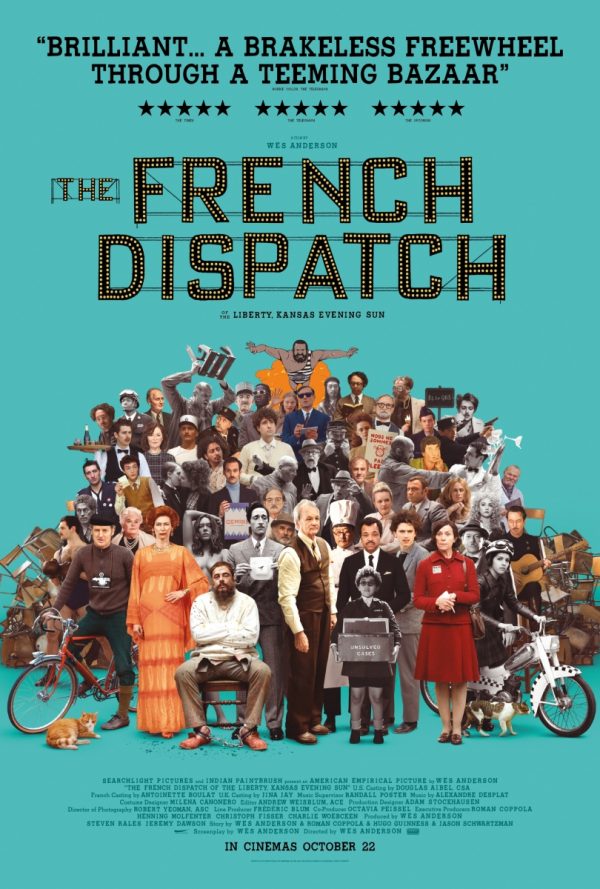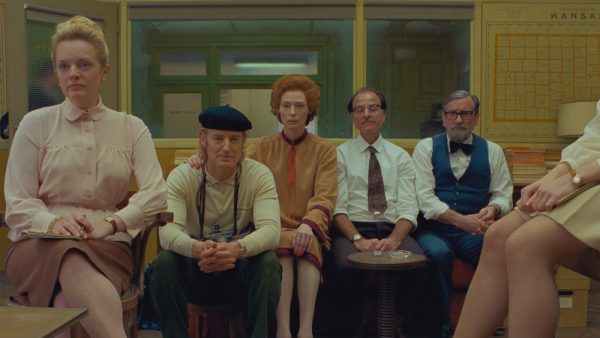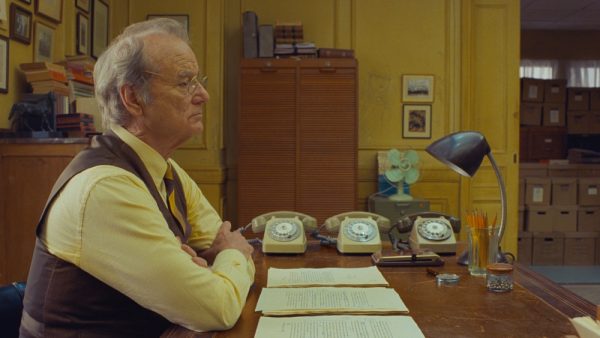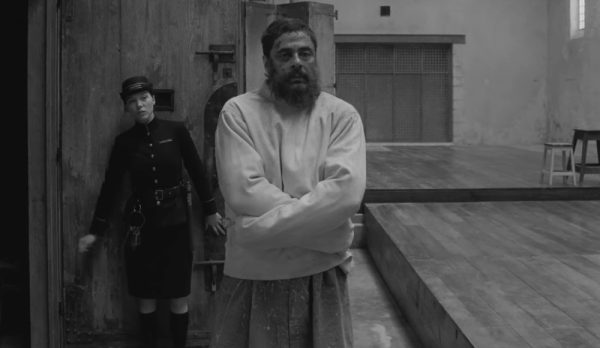The French Dispatch, 2021.
Directed by Wes Anderson.
Starring Benicio del Toro, Adrien Brody, Tilda Swinton, Léa Seydoux, Frances McDormand, Timothée Chalamet, Alex Lawther, Lyna Khoudri, Jeffrey Wright, Mathieu Amalric, Stephen Park, Bill Murray, and Owen Wilson.
SYNOPSIS:
Wes Anderson packs three stories, plus a prologue and an epilogue, into one film in his latest work, the anthology movie The French Dispatch. It moves at a rapid clip and features many of the director’s trademarks, including detached characters who may or may not resonate with you.
Either you get Wes Anderson’s films or you don’t. There’s not much middle ground in the writer/director’s work, which could best be described as storybooks for adults. Each of his movies is rich in detail, begging to be freeze-framed and pored over to understand all of the little nuances and jokes. I’m glad he wasn’t a filmmaker in the pre-home video era.
His latest work, The French Dispatch, is an anthology film whose premise is that each of its segments is an article in the final issue of the magazine, which was inspired by The New Yorker. The magazine’s editor, Arthur Howitzer Jr. (Bill Murray), is based on the notoriously mercurial Harold Ross, founder and first editor of The New Yorker, while the magazine’s writing staff was inspired by the works of James Thurber, James Baldwin, and many other early New Yorker scribes, who are all thanked during the end credits.
Each writer narrates their piece, starting with cycling reporter Herbsaint Sazerac, who gives the viewer a tour of the town Ennui-sur-Blasé, which is as comically French as you might imagine. The prologue sets the tone for the rest of a movie that might be best described as “jaunty.”
From there, we’re treated to the three main articles in the final issue, starting with art critic J.K.L. Berensen (Tilda Swinton), who regales us with the story of Moses Rosenthaler (Benicio del Toro), a psychotic murderer who has a gift for abstract paintings. A fellow inmate (Julien Cadazio, played by Adrien Brody), who happens to be an art dealer, decides to buy Moses’s latest work and use his rich uncles to create a buzz in the art world. All goes according to plan until Cadazio shows up three years later demanding to see Moses’s latest masterpiece.
Next, Lucinda Krementz (Frances McDormand) reports on the “Chessboard Revolution,” a student-led uprising that begins as anger over lack of access to the girls’ dorm and turns into a firestorm of protest over a student’s conscription into the military. Krementz becomes romantically involved with Zeffirelli (Timothée Chalamet), the leader of the revolution, and later writes a play based on her article.
Finally, food writer Roebuck Wright (Jeffrey Wright) details the culinary escapades of Lt. Nescaffier (Stephen Park), a police officer who doubles as his department’s head chef. When the police chief’s son is kidnapped, Nescaffier uses his culinary skills to help save the day.
I don’t think I’m spoiling anything by noting that there’s an epilogue in the form of an obituary for Howitzer, whose death leads off the film. His will included a stipulation that the magazine – a transformation of the Sunday supplement from Howitzer’s hometown newspaper in Liberty, Kansas – be shut down upon his passing, which is why we’re privy to the contents of the final issue.
Any of the three main stories in the film could have been a movie by itself, particularly the third one, which is rich with secondary characters who get mere scraps of screen time. As a result, The French Dispatch is a dense movie that moves through its tales at a rapid clip, inviting more opportunities for freeze-framing certain scenes than Anderson’s other movies.
In the end, though, while I enjoyed the film, I had trouble connecting with any of its characters the same way I was able to connect with the inhabitants of many of his other cinematic worlds, in particular The Royal Tenenbaums, The Life Aquatic with Steve Zissou, Fantastic Mr. Fox, and The Grand Budapest Hotel. Anderson’s characters always have a certain detachment to them, but the ones in The French Dispatch are all so cold and remote that I could appreciate them the same way I might appreciate a painting in an art gallery, without the desire to have it hanging in my home.
Your mileage may vary, of course. If you’re a Wes Anderson fan who’s also steeped in the history of The New Yorker, you may very well end up enjoying this movie a lot more than I did. I’ve read the magazine, but I’m not someone who’s going to necessarily catch all the winks and nods in The French Dispatch.
Disney provided me a Movies Anywhere code for this review. The trailer is the only extra found in the digital version of the film, which I assume is the same for the disc-based releases that will be out by the end of the month.
Flickering Myth Rating – Film: ★ ★ ★ / Movie: ★ ★ ★
Brad Cook
















